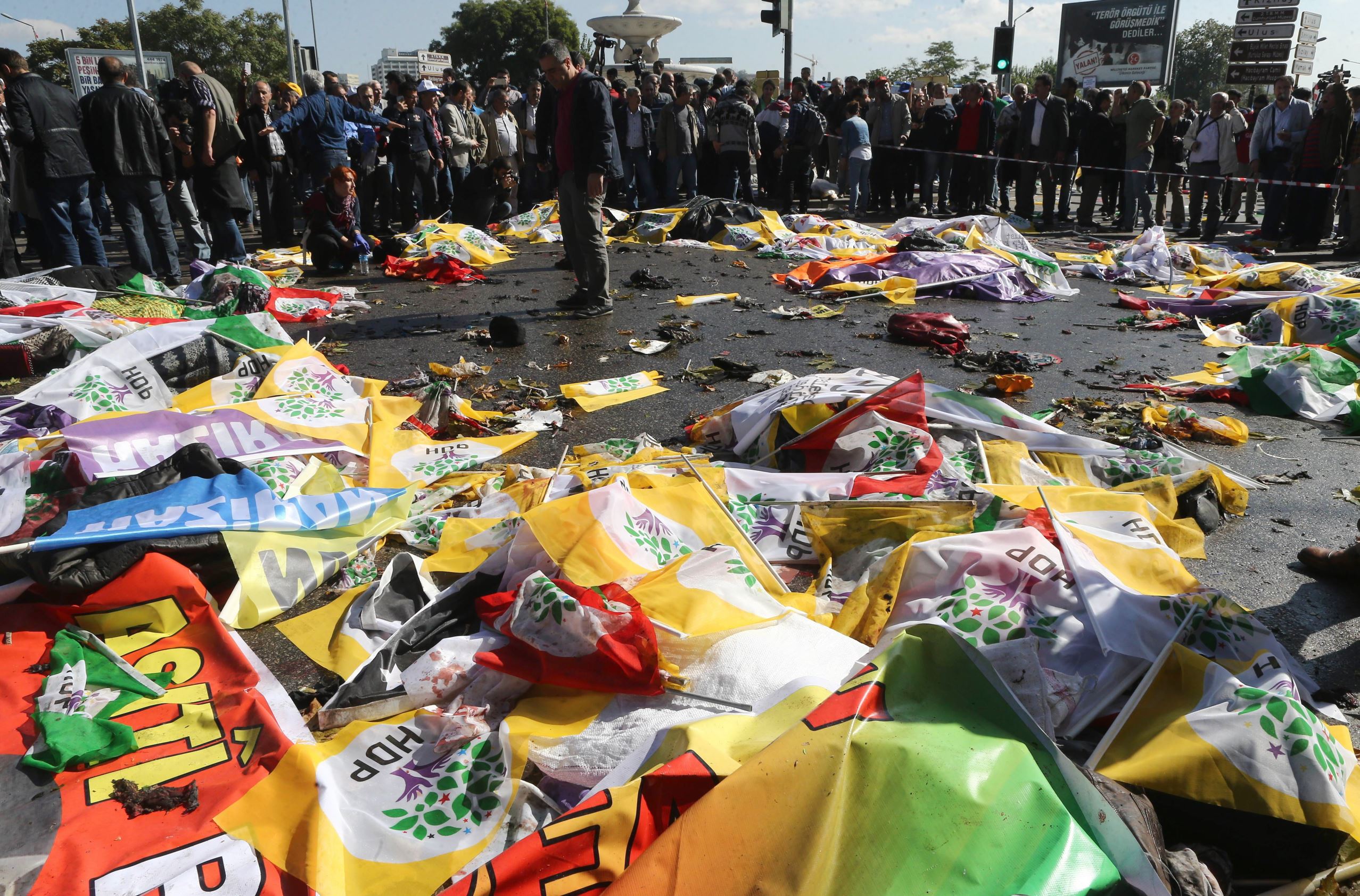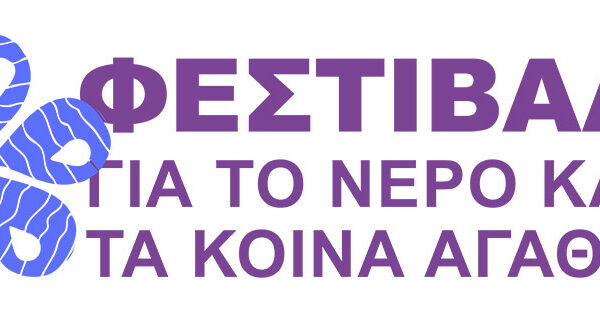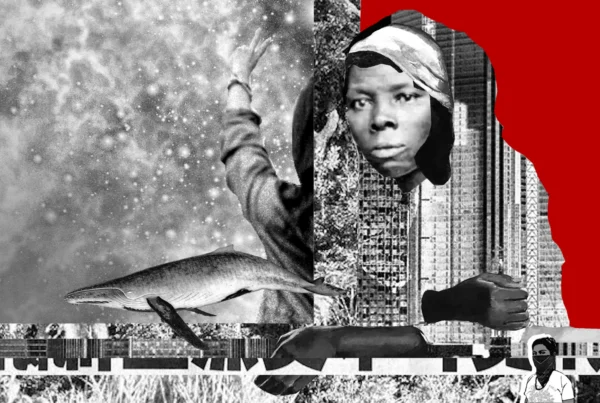Achieving substantial peace within Turkey and in the Middle East depends upon a thorough revision of war policies by all governments contracted with the Turkish regime and a genuine commitment to the de-escalation of militarization, including the cancellation of arms deals that support the violent suppression of democracy.
[The following statement was released on 17 October 2015 on change.org. Please scroll down for French, Turkish and German versions. To sign on to this petition, please click here.]
We believe that serious claims alleging the complicity of state agents in the perpetration of the Ankara massacre must be investigated by independent commissions, preferably under the aegis of the United Nations. All bi- and multi-lateral agreements with Turkey should be made conditional upon demonstrable efforts to end the intimidation, harassment, and murder of those who defend their basic rights.
We call for international solidarity with the peoples of Turkey who resist authoritarian and illegitimate rule. The deployment of extra-judicial means to subjugate the Kurdish population and silence opposition cannot be condoned or accepted as a political necessity, regardless of the pretext. The demonstration in Ankara was intended to call upon the Turkish government to resume the peace talks with the Kurds that it called off in spring of 2015.
We call for the protection of civilian lives, guarantees of freedom of assembly, and free and open elections, unhampered by violence or coercion. Achieving substantial peace within Turkey and in the Middle East depends upon a thorough revision of war policies by all governments contracted with the Turkish regime and a genuine commitment to the de-escalation of militarization, including the cancellation of arms deals that support the violent suppression of democracy.
***
Appel d’universitaires pour la solidarité internationale après l’attentat d’Ankara
L’attentat sanglant du 10 Octobre a fait plus de 100 morts parmi les manifestants qui s’étaient rassemblés à Ankara pour exiger du gouvernement turc la reprise des négociations de paix avec les Kurdes, autoritairement interrompues au printemps 2015.
Universitaires et intellectuels de différents pays, nous exigeons que le gouvernement turc soit sommé de rendre des comptes sur sa responsabilité dans ce massacre, et nous appelons tous les gouvernements à reconsidérer leurs relations actuelles avec le gouvernement turc.
De sérieuses présomptions existent en effet quant à la complicité d’agents de l’Etat dans la préparation de l’attentat. Seule une commission d’enquête indépendante, de préférence sous l’égide des Nations-Unies, peut faire toute la lumière sur ce point. Et dans l’attente de ses conclusions, il faut que tout accord bilatéral ou multilatéral dont la Turquie est partie prenante soit suspendu, du moins jusqu’à ce que le gouvernement d’Ankara ait démontré sa volonté de mettre fin aux intimidations, aux persécutions et aux assassinats de citoyens turcs qui revendiquent leurs droits fondamentaux.
Nous appelons à la solidarité internationale avec les peuples de Turquie qui refusent d’obéir à un pouvoir de plus en plus autoritaire et illégitime. L’usage massif de moyens extra-judiciaires pour soumettre la population kurde de Turquie et réduire l’opposition démocratique au silence, quels qu’en soient les prétextes, ne saurait se réclamer de quelque nécessité politique que ce soit. Nous exigeons que soient protégées les vies des civils, garanties la liberté de rassemblement et des élections libres et pluralistes, sans pressions ni violences.
Plus généralement, nous appelons à une révision complète des politiques de guerre de la part de tous les gouvernements collaborant avec le régime actuel en Turquie. Seule une telle révision peut apporter une paix durable en Turquie et au Moyen-Orient. Il faudrait aussi qu’elle s’accompagne d’un véritable engagement en faveur de la démilitarisation des conflits, y compris par l’annulation des contrats d’armements utilisés pour noyer dans la violence les aspirations démocratiques des citoyens de la région.
***
Akademisyenlerden Ankara Katliamı Sonrasında Uluslararası Dayanışma Çağrısı
10 Ekim’de Ankara’da 100’den fazla barış göstericisini öldüren korkunç bomba saldırısının ardından, biz aşağıda imzası bulunan akademisyen ve araştırmacılar, Türkiye hükümetinden bu olayların hesabını vermesini, tüm dünya hükümetlerinin de Türkiye hükümetiyle ilişkilerini gözden geçirmelerini talep ediyoruz.
Ankara katliamının gerçekleşmesinde devlet aktörlerinin işbirliği olduğuna dair ciddi iddiaların Birleşmiş Milletler çatısı altında bağımsız komisyonlarca soruşturulması gerektiğine inanıyoruz. Türkiye ile mevcut tüm ikili ve çok taraflı anlaşmalar, temel haklarını savunan insanların sindirilmemesi, taciz edilmemesi ve katledilmemesi için somut adımlar atılması koşuluna bağlanmalıdır.
Otoriter ve gayrımeşru bir rejime direnen Türkiye halklarıyla uluslararası dayanışma için çağrı yapıyoruz. Kürt nüfusu sindirmek ve muhalefeti susturmak için yasal olmayan araçların devreye sokulması her ne bahaneyle olursa olsun onanamaz, siyasi zorunluluk olarak mazur görülemez. Ankara’daki yürüyüşün amaçlarından biri, Türkiye hükümetinin Kürtlerle sürdürdüğü ve 2015 baharında askıya aldığı barış görüşmelerini yeniden başlatmasını sağlamaktı.
Türkiye’de sivil halkın yaşam hakkının korunmasını, toplanma özgürlüğünün güvence altına alınmasını, şiddetten ve baskıdan arınmış özgür ve açık seçimlerin sağlanmasını talep ediyoruz. Türkiye ve Orta Doğu’da kalıcı barışın sağlanması için, Türkiye rejimiyle anlaşmalı olan tüm hükümetlerin savaş politikalarını baştan aşağı gözden geçirmeleri, bölgede militarizasyonu azaltmak için samimi olarak sorumluluk sergilemeleri şarttır, buna demokrasinin şiddetle bastırılmasına vesile olan silah satışlarının iptali de dahildir.
***
Unter dem Eindruck des entsetzlichen Bombenanschlags, der in Ankara am 10. Oktober mehr als einhundert Friedensdemonstrant/innen das Leben gekostet hat, rufen wir, die unterzeichnenden Akademiker/innen und Wissenschaftler/innen, die türkische Regierung dazu auf, für diese Ereignisse Rechenschaft abzulegen. Ebenso fordern wir sämtliche Regierungen dazu auf, ihre Beziehungen zur türkischen Regierung kritisch zu prüfen.
Die schwerwiegenden Vorwürfe einer Komplizenschaft von Staatsakteuren am Massenmord von Ankara müssen überprüft und eine unabhängige Untersuchungskommission, vorzugsweise unter Federführung der Vereinten Nationen, eingesetzt werden. Alle bi- und multilateralen Vereinbarungen mit der Türkei müssen davon abhängig gemacht werden, dass nachweislich jede Anstrengung unternommen wird, um die Einschüchterungen, die Schikane, und die Morde an denen, die lediglich ihre Grundrechte verteidigen, zu beenden.
Wir rufen zur internationalen Solidarität mit den Menschen in der Türkei auf, die sich autoritärer und illegitimer Herrschaft widersetzten. Die vermeintlichen politischen Notwendigkeiten, mit denen der Einsatz extralegaler Mittel zur Unterdrückung der kurdischen Bevölkerung und die Versuche, die Opposition zum Schweigen zu bringen, begründet werden, können nicht akzeptiert werden. Die Demonstration in Ankara war ein Aufruf an die türkische Regierung, die Friedensgespräche mit den Kurden, die sie im Frühjahr 2015 abgebrochen hatte, wieder aufzunehmen.
Wir fordern: den Schutz der Zivilbevölkerung, die Garantie der Versammlungsfreiheit, freie und offene Wahlen, unbeeinflusst von Zwang und Gewalt. Damit in der Türkei und im Mittleren Osten nachhaltig Frieden hergestellt werden kann, müssen alle Regierungen, die mit dem türkischen Regime vertraglich verbunden sind, ihre Kriegspolitik revidieren und sich auf ein Ende der Militarisierung verpflichten. Dies beinhaltet den Stopp von Waffenexporten, die der gewaltsamen Unterdrückung von Demokratie dienen.
SIGNATORIES
Meltem Ahıska, Boğaziçi University, Istanbul
Etienne Balibar, Université de Paris 10 /Kingston University London
Judith Butler, University of California, Berkeley
Ayça Çubukçu, London School of Economics
Başak Ertür, Birkbeck College, University of London
Zeynep Gambetti, Boğaziçi University, Istanbul
Marianne Hirsch, Columbia University, New York
Elena Loizidou, Birkbeck, University of London
Joan Scott, Institute for Advanced Study, Princeton
Elda Abrevaya, psychologist, psychoanalyst, Istanbul
Lila Abu-Lughod, Columbia University, New York
Gilbert Achcar, SOAS, University of London
Hülya Adak, Sabancı University
Gülcan Akırmak, clinical psychologist, Işık University, Istanbul
Nadje Al-Ali, SOAS, University of London
Greg Albo, York University, Toronto
Ayşe Gül Altınay, Sabancı University, Istanbul
Janine Altounian, essayist and translator
Elmar Altvater, Freie Universität, Berlin
Michael Arfken, University of Prince Edward Island, Charlottetown
Maria Aristodemou, Birkbeck, University of London
Talal Asad, Graduate Center, City University of New York
Athena Athenasiou, Panteion University, Athens
Bilgin Ayata, University of Basel
Albena Azmanova, University of Kent
Evren Balta, Yıldız Technical University, Istanbul
Amy Bartholomew, Carleton University, Ottowa
Pınar Bedirhanoğlu, Middle East Technical University, Ankara
Zeineb Ben Said Cherni, Faculté des Sciences Humaines et Sociales de Tunis
Seyla Benhabib, Yale University, Connecticut ;
Henry Bernstein, SOAS, University of London
Sophie Bessis, Institut des Relations Internationales et Stratégiques, Paris
Chetan Bhatt, London School of Economics
Jacques Bidet, Université de Paris-Ouest
Constantin Boundas, Trent University
Bill Bowring, Birkbeck, University of London
Hamit Bozarslan, EHESS, Paris
Sarah Bracke, Ghent Univeristy
Wendy Brown, University of California, Berkeley
Eddie Bruce-Jones, Birkbeck, University of London
Susan Buck-Morss, City University of New York
George Caffentzis, University of Southern Maine
Claude Calame, Ecole des Hautes Etudes en Sciences Sociales, Paris
Craig Calhoun, London School of Economics
Marie-Claire Caloz-Tschopp, Collège International de Philosophie, Paris
Al Campbell, University of Utah
Joseph H. Carens, University of Toronto
Senija Causevic, SOAS, University of London
Paula Chakravartty, New York University
Anastasia Chamberlen, Birkbeck, University of London
Partha Chatterjee, Columbia University, New York / Centre for Studies in Social Sciences, Calcutta
Patrice Cohen-Séat, lawyer, Paris
Catherine Colliot-Thélène, Université Rennes 1
Maria José Contreras, Universidad Catolica de Chile, Santiago
Simten Coşar, Hacettepe University, Ankara
Deborah Cowen, University of Toronto
Christopher Cramer, SOAS, University of London
Paolo Cuttitta, Vrije Universiteit Amsterdam
Hamid Dabashi, Columbia University, New York
Angela Y. Davis, University of California, Santa Cruz
Boaventura de Sousa Santos, University of Coimbra
Jodi Dean, Hobart and William Smith Colleges, Geneva, New York
Sila Demirors, SOAS, University of London
Costas Douzinas, Birkbeck, University of London
Bora Erdağı, Kocaeli University
Aysegul Ergul, Carleton University, Ottowa
Samera Esmeir, University of California, Berkeley
Jean-Louis Fabiani, Ecole des Hautes Etudes en Sciences Sociales, Paris/ Central European University, Budapest
Éric Fassin, Université Paris 8
Shelley Feldman, Cornell University, Ithaca
Elisabeth Gauthier, Transform! Europe, Paris
Akis Gavrilidis, University of Macedonia, Thessaloniki
Adam Gearey, Birkbeck, University of London
Nicole Gervasio, Columbia University, New York
Peter Geschiere, University of Amsterdam
Paul Gilroy, King’s College, London
Marcial Godoy-Anativia, New York University
Jamie Gough, University of Sheffield
David Graeber, London School of Economics
Victor Granado Almena, Universidad Computense, Madrid
Oscar Guardiola-Rivera, Birkbeck, University of London
Raquel S. L. Guzzo, Pontifícia Universidade Católica de Campinas
Bella Habip, psychoanalyst, Istanbul
Michael Hardt, Duke University, Durham
Laurence Harris, SOAS, University of London
David Harvey, Graduate Center, City University of New York
Nanna Heidenreich, Braunschweig University of Art
Jean Howard, Columbia University, New York
Aida A. Hozic, University of Florida
Alan Hunt, Carleton University, Ottowa
Andreas Huyssen, Columbia University, New York
Ahmet İnsel, Université de Galatasaray, Istanbul / Université Paris 1
Sibel Irzık, Sabancı University, Istanbul
Engin Isin, Open University, London
Mehmet İzbudak, SOAS, University of London
Banu Karaca, Forum Transregional Studies, Berlin
Cristobal Kay, SOAS, University of London
Sarah Keenan, Birkbeck, University of London
Catherine Kellogg, University of Alberta
Jane Kelly, Kingston University
Pierre Khalfa, Fondation Copernic, Paris
Milena Grass Kleiner, Pontifica Universidad Catolica de Chile
Kritnet (Network Critical Migration and Border Regime Studies), Germany
Cecile Lavergne, Université de Paris-Ouest
Alisa Lebow, University of Sussex
Jens Lerche, SOAS, University of London
Jean-Claude Léveque, Université de Turin
John Lister, Coventry University
Yahya Madra, Boğaziçi University, Istanbul
Thomas Marois, SOAS, University of London
Ruth Marshall, University of Toronto
Athanasios Marvakis, Aristotle University of Thessaloniki
David McNally, York University, Toronto
Angela McRobbie, Goldsmiths, University of London
Brinkley Messick, Columbia University, New York
Sandro Mezzadra, University of Bologna
Alessandra Mezzadri, SOAS, University of London
Pauline Milani, University of Fribourg
Shahrzad Mojab, University of Toronto
John Morrissey, National University of Ireland, Galway
John Mullen, Université de Rouen
Jean-Luc Nancy, Université de Strasbourg
Antonio Negri
Lorie Novak, New York University
Denis O’Hearn, State University of New York, Binghamton
Bertrand Ogilvie, Université Paris 8
Şebnem Oğuz, Başkent University, Ankara
Seçkin Sertdemir Özdemir, Université de Galatasaray, Istanbul
Ceren Özselçuk, Boğaziçi University, Istanbul
Leo Panitch, York University, Toronto
Xavier Papaïs, Université de Genève
Ian Parker, University of Leicester
David Pavón-Cuéllar, Universidad Michoacana de San Nicolás de Hidalgo
Ilaria Possenti, University of Verona
Geraldine Pratt, University of British Columbia
Manjeet Ramgotra, SOAS, University of London
Jacques Rancière, Université Paris 8
George S. Rigakos, Carleton University, Ottowa
Michele Riot-Sarcey, Université Paris 8
Bruce Robbins, Columbia University, New York
Jacqueline Rose, Birkbeck, University of London
Srirupa Roy, University of Göttingen
Alfredo Saad Filho, SOAS, University of London
Leticia Sabsay, London School of Economics
Pierre Salama, Université Paris 13
Darrow Schecter, University of Sussex
Sarah Schilliger, University of Basel
Lynne Segal, Birkbeck, University of London
Pinar Selek, sociologue et écrivain
Jacques Servin, New York University
Adania Shibli, writer
Subir Sinha, SOAS, University of London
Vicky Skoumbi, editor-in-chief of Aletheia
Alisa Solomon, Columbia University, New York
Céline Spector, Université Bordeaux Montaigne
Barbara Spinelli, member of the European Parliament
Leo Spitzer, Dartmouth College, New Hampshire
Annabelle Sreberny, SOAS, University of London
Bernard Stiegler, Compiègne / Nanjing / Humboldt Universities / Centre Pompidou
Marita Sturken, New York University
Christophe Tafelmacher, lawyer, Lausanne
Michael Taussig, Columbia University, New York
Diana Taylor, New York University
Aylin Tekiner, artist and activist
Nicholas Thoburn, University of Manchester
Nilgün Toker, Ege Üniversitesi, İzmir
Charles W. Tolman, University of Victoria
André Tosel, Université de Nice
Elena Tzelepis, University of Athens
Salim Vally, University of Johannesburg
Eleni Varikas, Université Paris 8
Dimitris Vergetis, director of Aletheia
Marie-Christine Vergiat, députée européenne
Rebecca Vilkomerson, Jewish Voice for Peace, Oakland
Immanuel Wallerstein, Yale University, New Haven
Eyal Weizman, Goldsmiths, University of London
Michael O. West, State University of New York, Binghamton
Frieder Otto Wolf, Freie Universität, Berlin
Gaye Yılmaz, Boğaziçi University, Istanbul
Slavoj Zizek, University of Ljubljana







